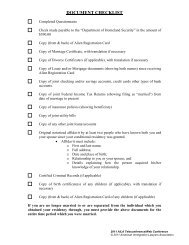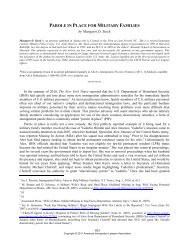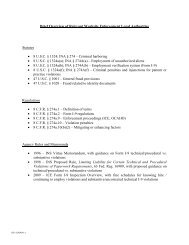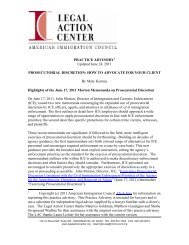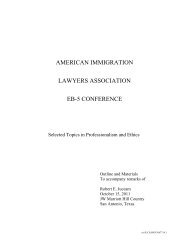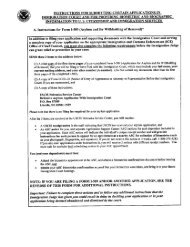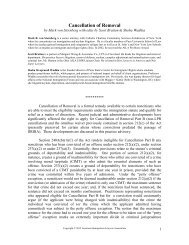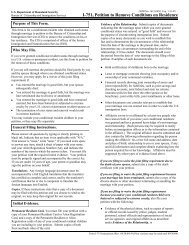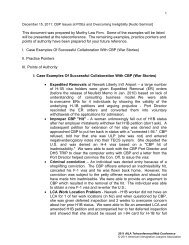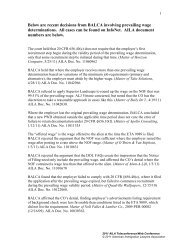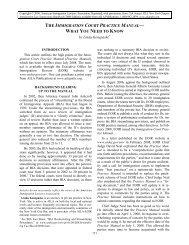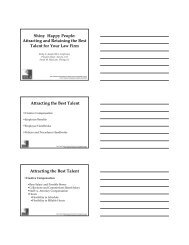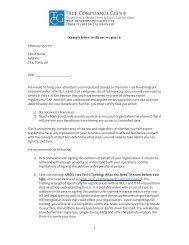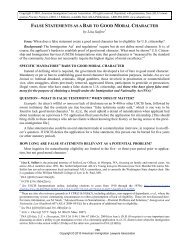Resources for 04-26-11 Seminar - AILA webCLE
Resources for 04-26-11 Seminar - AILA webCLE
Resources for 04-26-11 Seminar - AILA webCLE
Create successful ePaper yourself
Turn your PDF publications into a flip-book with our unique Google optimized e-Paper software.
WAC 07 277 53214Page <strong>11</strong>not qualify to file as a "new office" petitioner. 7 8 C.F.R. § 214.2(l)(1)(ii)(F). Regardless of whether apetitioner files a visa petition as a new office, the director may request "such evidence as the director, in his orher discretion, may deem necessary." 8 C.F.R. § 214.2(I)(3)(viii). If the director decides to request evidencethat relates to the physical premises ofthe operation or the financial ability ofthe petitioner to remunerate thebeneficiary, the director may do so regardless ofwhether the petitioner filed as a new office or as a petitionerthat has been doing business <strong>for</strong> more than one year. As long as the requested evidence is material to thepetitioner's eligibility, the director may legitimately request such additional evidence. And upon reviewingthe initial petition or the extension petition, along with any additional evidence that the director may haverequested, the director may deny the petition if he or she determines that the petitioner has not satisfied itsburden ofproof.ConclusionAccordingly, the petitioner, as a component corporation ofthe larger organization, has established that itis doing business in a regular, systematic, and continuous manner. The director's decision will be withdrawnas it relates to this issue.II.Issue: Will the Beneficiary Be Serving in a Capacity Involving Specialized Knowledge?The second issue in this matter is whether the petitioner has established that the beneficiary will be serving ina capacity involving "specialized knowledge." Upon review, even under counsel's more generous view oftheappropriate standard, the petitioner has not demonstrated that this employee possesses knowledge that may bedeemed "special" or "advanced" under the statutory definition at section 214(c)(2)(B) of the Act. Thedecision ofthe director will be affirmed as it relates to this issue.As previously noted, section 214(c)(2)(B) ofthe Act provides:For purposes of section 101(a)(15)(L), an alien is considered to be serving in a capacityinvolving specialized knowledge with respect to a company if the alien has a specialknowledge of the company product and its application in international markets or has anadvanced level ofknowledge ofprocesses and procedures ofthe company.The regulation at 8 C.F.R. § 214.2(l)(1)(ii)(D) defines "specialized knowledge" as:7 If a petitioner relies on U.S.-based parent, branch, affiliate, or subsidiary to show that it has been doingbusiness in the United States <strong>for</strong> one year or more, it is critical that the petitioner accurately complete Part 5of the Form 1-129 ("Basic In<strong>for</strong>mation About The Proposed Employment And Employer"). When the <strong>for</strong>masks <strong>for</strong> in<strong>for</strong>mation about the petitioning employer, the petitioner should complete the <strong>for</strong>m with truthful andaccurate in<strong>for</strong>mation about the actual petitioning corporation. To avoid any misunderstanding, if thepetitioner elects to rely on "a parent, branch, affiliate, or subsidiary" to show that it is not a new office, thepetitioner should explain this clearly in the Form 1-129 Supplement L and any attached brief or addendum,and demonstrate the relationship between the petitioner and the larger organization.



